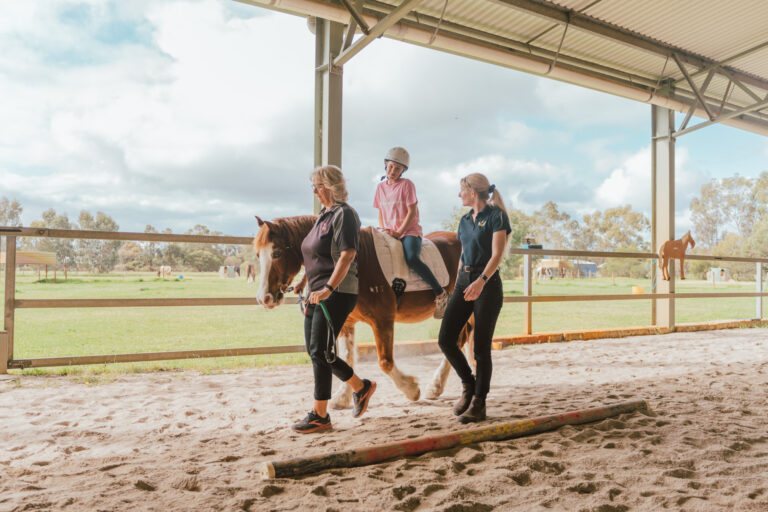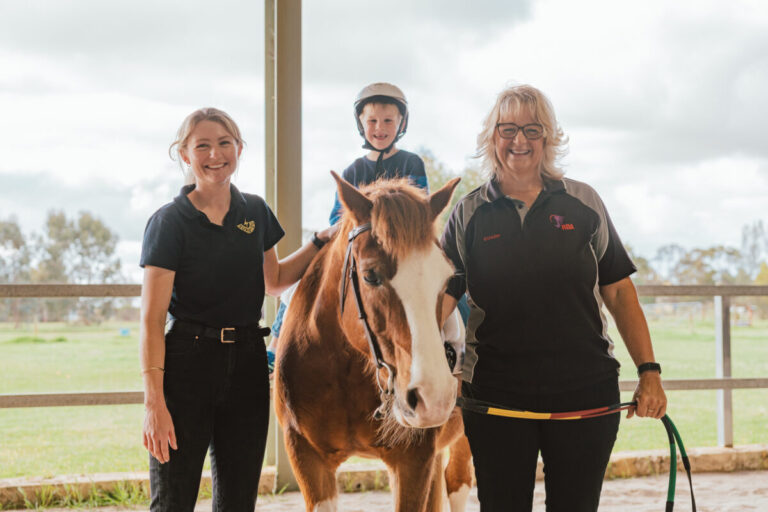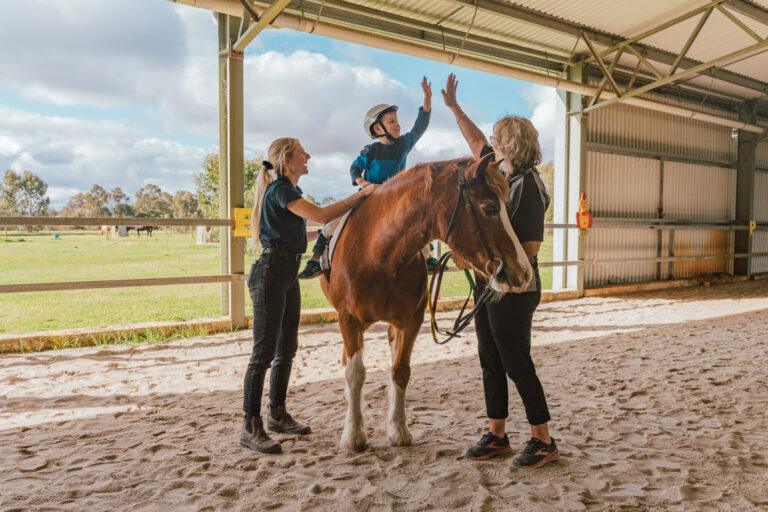Introduction to hippotherapy in Perth
Hippotherapy is a therapeutic tool utilised by physiotherapists, speech pathologists and occupational therapists to aid clients in achieving their goals.
At Superyou Therapy, our Perth-based physiotherapist, Lily Harris uses hippotherapy as an effective treatment technique for our clients to achieve their mobility goals, with the support of the the RDA Oakford (Riding for the Disabled) team.
What is hippotherapy?
Hippotherapy is a treatment technique carried out by specially trained physiotherapists, occupational and speech therapists. Hippotherapy utilises the impact of the horse’s movement which mimics the movement of a human pelvis when walking. This graded motor and sensory input from the horse influences the clients movement and facilitates achieving their therapy goals.
Hippotherapy supports a range of different functions, requiring the client to use to stay balanced on the horse while strengthening neural connections for improved movement, control, posture, muscle tone and sensory processing for balance and body awareness.
We currently have no availability for hippotherapy, however we are taking expressions of interest for sessions in 2025. Please complete a referral with your request, and one of our team will be in touch when we can confirm opportunities for 2025.


Hippotherapy vs equine-assisted therapy
While many think of hippotherapy and equine-assisted therapy as the same thing, in actuality they are very different tools that support a broad range of needs. The only commonality between them is the use of horses (not hippos!).
Hippotherapy is a treatment tool used by physiotherapists support activity that uses the movement of horses to support mobility goal achievement. The name hippotherapy comes from the Greek word for horse (hippos) and treatment (therapy), and is an evidence-based practice that uses the movement of the horse to influence sensory, neuromotor and cognitive systems in clients.
Equine-assisted therapy is a broader, experiential therapy approach that addresses areas like PTSD, substance abuse and addictions, depression and anxiety. Equine-assisted therapy is an effective tool, but isn’t used by physiotherapists to support mobility goals.
Hippotherapy with Superyou
Our Superyou Therapy have recently commence providing hippotherapy in Perth; something we are very proud to see.
Superyou Therapy’s Hippotherapy service is run by our highly-skilled and highly passionate physiotherapist, Lily Harris, who took the reins in bringing this opportunity to our clients. This has been no easy feat, with an extensive process to ensure industry-standard accreditation and training.
A smiling young boy sits on a horse, with two women standing on either side
Sessions are usually done walking. Here, the horse’s legs move at 95 to 110 repetitions per minute which gives the client an opportunity to practice these rhythmic movements with high repetition, changing speed, direction, or amplitude. Throughout each session, it’s this repetition that can improve a client’s ability to sit, walk, climb, run, reach, write, dress, speak, eat and go to the toilet.
To ensure the safety and efficacy of patient sessions, our hippotherapy team includes:
- A horse handler
- Two side walkers: Volunteers who walk next to the horse and support each side of the client.
- RDA coach
- Therapist: Physiotherapist provides direction to team
Hippotherapy intervention is suited to clients over 3 years of age and older. Suitable candidates for hippotherapy include those who have goals related to walking, standing, strength, coordination, posture and balance. For participants who are funded through the NDIS, their plan must be plan-or-self-managed.


Supporting a range of client needs
Using hippotherapy as a treatment tool can help clients with a variety of goal areas. Research has shown benefits in:
- Balance, righting, and equilibrium reactions
- Normalising muscle tone
Strength and endurance - Core strength and dynamic postural stability
- Midline orientation
- Gait walking and running
- Transfers
- Arousal / attention
- Bilateral integration
- Hand eye coordination and spatial awareness
- Motor planning and sequencing
- Circulation
- Bladder and bowel control
- Respiration and saliva control
- Speech and language
- Motivation, self-esteem and confidence in client’s own abilities.
The benefits of hippotherapy
Evidence shows the following populations have had positive outcomes from hippotherapy intervention:
- Autism spectrum disorder
- Cerebral Palsy (GMFCS I-III)
- Stroke
- Multiple sclerosis
- Spinal cord injury
- Cancer
- Down Syndrome
- Sensory processing disorder
- Spina Bifida
- Global developmental delay
- Dyspraxias and developmental coordination disorder
- Genetic disorders



